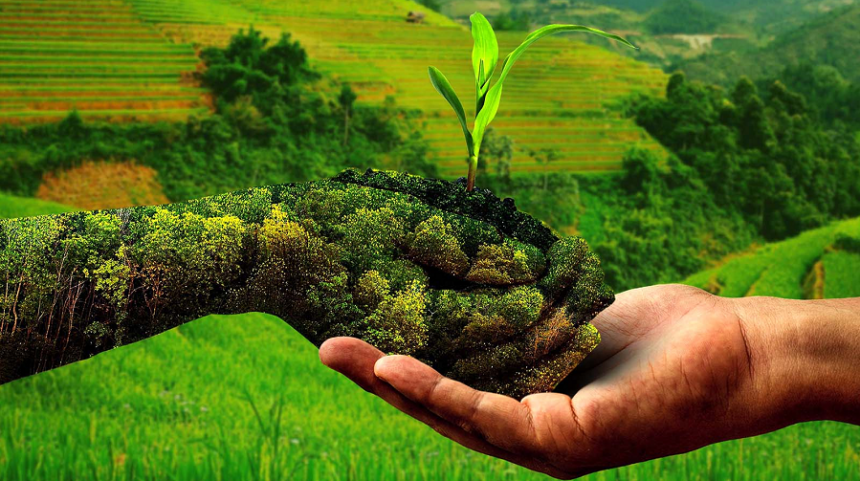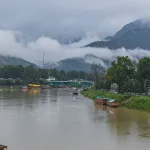In the present era, as far as agriculture is concerned; all our endeavors are directed towards resilience and sustainability of the sector. The gains in the farm sector have been overshadowed by the adverse effects on our environment largely due to unscientific and crude methods of our cultivation. The post green revolution era in the country witnessed excessive use of chemical fertilizers and plant protection chemicals. That entire chemical ultimately forced its way deeper into the layers of earth or got washed away into the water bodies. All this rendered air, water and soil unfit for breathing, drinking and cultivation.
There have been studies which indicate that the increase in concentration of air pollutants result in the increased yield loss in crops like Barley and Soybean. Similarly the water bodies are loaded with contaminants like Arsenic, Lead, Chromium and Nickel. The level of Uranium in the ground water is 50 per cent above the WHO norms. The soil is also getting polluted due to accumulation of gases like Sulphur dioxide, Carbon monoxide, Nitrous oxide which retard the soil health, its fertility and the microbial activity in the soil.
It was only after the Brundtland commission came with the concept of Sustainable development and the world realized that the methods of farming being practiced with heavy use of chemicals were not sustainable. They may have some advantage in the short run in terms of increase in yield, but in the long run they are detrimental to the mankind and life on this planet. Apprehensions are that if urgent steps are not taken to change the course, the situation may go out of our hands. Emphasis is now being laid on practices which offset the harmful effects of the chemical led farming. In this regard, Natural Farming is now being promoted as a sustainable and remunerative approach towards farming.
Natural Farming is the ‘Zero Budget Natural Farming (ZBNF)’, a technique developed by Subash Palekar, a 66 years old agriculturist from Belora village of Amravati district in Maharashtra’s Vidarbha region. The person quit his graduate agriculture degree to do something different. Subash Palekar has also been conferred with India’s fourth highest civilian award Padam Shree. He is the pioneer of ‘zero-budget natural/spiritual farming’. Palekar is not supportive of the Organic farming or the Japanese philosopher Masanobu Fukuoka’s Natural farming. Organic farming, as he says is based on composting and vermi compost techniques that actually pollute the atmosphere as the resultant manures are known to emit huge quantities of greenhouse gases like methane.
Similarly, Fukuoka’s natural farming that prescribes sowing and harvesting without any intervention leads to excessive weed growth in farms, affecting crop yields. His concept of Natural Farming/ZBNF relies on the following four basic components: Natural Farming starts with Bijamrita. This is primarily the mixture of cow dung, urine and water. Seeds are treated with the Bijamrita before being sown in the fields. Next at the heart of Natural Farming is Jivamrit. It is a fermented solution containing 200 litres water, 5-10 litres cow urine, 10 kg dung, 1 kg each of Gur (Jaggery) and Besan (gram flour), and a handful of soil from the farm bund for every acre. Jiwamrita basically nurtures thousands of bacteria essential for healthy crop growth.
With the application of Jeevamrita, one can get 5-6 quintals of cotton and 3-6 quintals of soya bean per acre in non-irrigated patches. On irrigated patches, these can go up to 10 quintals. Jiwamrita has also been reported to contribute to soil health and also increasing the plant’s capacity to even tolerate inundation from heavy rains or hailstorms. Besides Bijamrita and Jeevamrita, the two other vital components of Natural Farming are Whapasa and Mulching (Acchadana). Mulching is basically a cover of dried materials from farm or green unused materials from farm like grasses. A carpet of harvested crop residue between crop rows helps to absorb moisture from the atmosphere and also prevents emergence of weeds. Plastic sheets can also be used as a mulching material.
Whapasa means the mixture of 50% air and 50% water vapour in the cavity between two soil particles. It is the soil’s microclimate on which soil organisims and roots depend for most of their moisture and some of their nutrients. It increases water availability enhances water use efficiency and builds resilience against drought. Whapasa encourages reducing irrigation, irrigating only at noon as it coincides with peak photosynthesis and in alternate furrows. To overcome the incidence of insect pests, Natural Farming relies on various extracts called as ‘Astra’. Agniastra consists of a mixture of locally available resources like Chilli, Garlic, Neem and cow urine. These all are used to control the insects. The Bramhastra is another mixture of locally available plants like Neem, Guava, Custard Apple, Pomegranate etc. with cow urine and is used to spray over the leaves of the plant. The Neemastra is also the mixture of cow dung, urine, neem etc. and is very effective against insects that suck leaves. Dashparni extract is also another effective extract for control of diseases and insect pests.
Gomutra (cow’s urine), the golden liquid once overlooked is now again the talk of farming community and the champions of resilience and sustainability in agriculture. It has been discovered by the farming community as the panacea to most of their field problems related to management and control of insect pest and diseases and maintenance of soil health. Wisdom of the past did not considered it to be merely a waste product; instead considered Gomutra as a treasure trove of nutrients, enzymes and very useful microbes. Cow in the country is considered to be a symbol of motherhood.
In Natural farming, this elixir not only nourishes the soil with Nitrogen, but its anti microbial properties also help in keeping away diseases and insect pests from the crops. Nitrogen, phosphorus and potassium are the three major nutrients required for healthy plant growth. Cow urine contains significant amounts of both nitrogen and potassium. Gomutra is indispensible in Natural Farming. The Gomutra to be used in Natural Farming should be only from an indigenous cow and along with cow dung, its formulation does miracles. Gomutra is used for preparations of no. of growth promoters and bio pesticides which are effective in improving soil fertility.
Research studies reveal that only 20% of Nitrogen material consumed by cattles is absorbed and 80% is excreted in urine and dung of which 52% of Nitrogen returns in urine and 28% in dung. In 24 hours a cow can give 6 litres of urine and if a farmer has two cows, the farmer will have 4380 litres of urine in one year which equals to 65 kilogram of Nitrogen and that amounts of Nitrogen equals to 136 kilogram of Urea. Besides, the residual effect of Gomutra is also present in next crop. One desi cow can nourish as much as 30 acres.
Cow urine works as a purifier while fresh cow dung is an insect repellent and acts as a germicidal. Cow urine has therapeutic aspects, medicinal value as mentioned in Panchgavya. Cow urine alone is also a good liquid fertilizer and can be used directly for spraying the crop. Dilute 1 lit of cow urine with 100 lit of water and use it as foliar spray. For one acre of crop 200 lit of such dilute suspension will be sufficient. This can be used in any crop in all the seasons. The cow urine can be used as bio-pesticide. It contains 95% water, 2.5% urea, minerals, 24 types of salts, hormones, and 2.5% enzymes. It also contains iron, calcium, phosphorus, carbonic acid, potash, nitrogen, ammonia, manganese, iron, sulfur, phosphates, potassium, urea, uric acid, amino acids, enzymes, cytokine and lactose.
It can thus be concluded that Natural Farming comes with numerous benefits and is rightly called as the future of farming. Krishi Vigyan Kendra all across the country are already on the job of awareness/sensitization and conducting demonstrations regarding various natural farming practices.
(The author writes on agriculture and social issues, can be reached at: [email protected])








